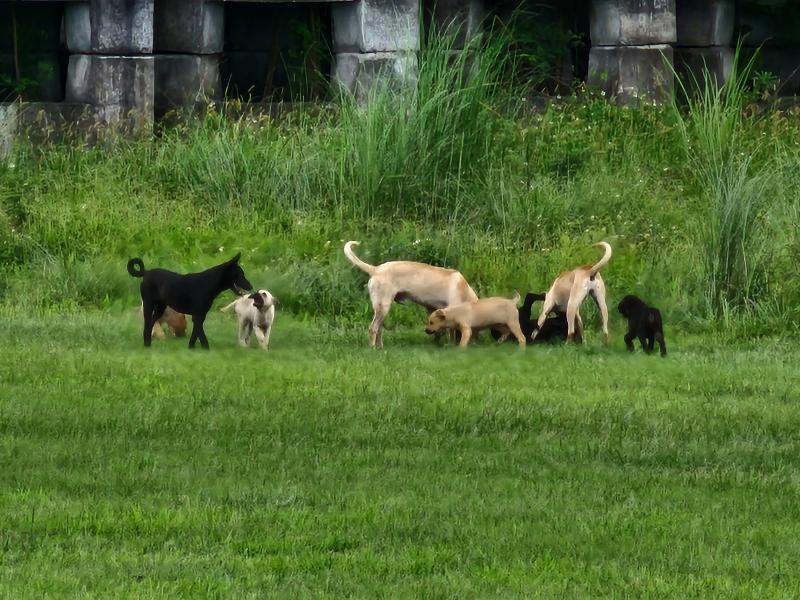The Ministry of Agriculture today said it is already working to solve issues related to wildlife conservation called out by the Walk for Wildlife Alliance, which is holding its second annual parade on Sunday.
The alliance’s first demand is to improve management and reduce the number of stray cats and dogs, calling for clarity on the definition of pet ownership, field investigations and re-evaluation of “trap, neuter, return” strategies.
Its second demand is to strengthen the management of stray dogs in biodiversity hotspots, advocating to keep these areas dog-free and enforce feeding bans.

Photo: Hua Meng-ching, Taipei Times
Its third demand is to improve public awareness of wildlife conservation and pet welfare, and include dogs and cats as invasive species in curricula to make education more comprehensive.
The key problem is the limited capacity of local government to implement wildlife protection measures in biodiversity hotspots, Department of Animal Welfare Deputy Director Chen Chung-hsing (陳中興) said in an interview.
The ministry implemented a plan to relocate stray dogs in nine designated hotspots for leopard cats starting in October last year in an effort to protect the endangered species, he said.
The plan requires owners to register and neuter their dogs and stipulates that if a dog’s owner cannot be found, the dog should be captured and relocated, Chen said.
The ministry, which opposes feeding all animals, is working with local governments to promote feeding bans in these hotspots, but since “biodiversity hotspot” is not a legal term, governments must impose fines on feeding based on the Waste Disposal Act (廢棄物清理法), he said.
The ministry has also helped local governments that manage biodiversity hotspots increase space for stray dogs, Forestry and Nature Conservation Agency Director-General Lin Hwa-ching (林華慶) said.
The public is increasingly aware that stray cats and dogs can be harmful to wildlife, but the problem cannot be solved with a single measure, Lin said.
“The issue must be tackled systematically, with efforts from multiple angles, and different organizations must reach a consensus to resolve the issue,” he said.

The Grand Hotel Taipei on Saturday confirmed that its information system had been illegally accessed and expressed its deepest apologies for the concern it has caused its customers, adding that the issue is being investigated by the Ministry of Justice Investigation Bureau. The hotel said that on Tuesday last week, it had discovered an external illegal intrusion into its information system. An initial digital forensic investigation confirmed that parts of the system had been accessed, it said, adding that the possibility that some customer data were stolen and leaked could not be ruled out. The actual scope and content of the affected data

DO THEY BITE IT? Cats have better memories than people might think, but their motivation is based entirely around the chance of getting fed Cats can remember the identity of the people who fed them the day before, Taipei-based veterinarians said on Friday, debunking a popular myth that cats have a short memory. If a stray does not recognize the person who fed them the previous day, it is likely because they are not carrying food and the cat has no reason to recognize them, said Wu Chou Animal Hospital head Chen Chen-huan (陳震寰). “When cats come to a human bearing food, it is coming for the food, not the person,” he said. “The food is the key.” Since the cat’s attention is on the food, it

A New York-based NGO has launched a global initiative to rename the nation’s overseas missions, most of which operate under the name "Taipei," to "Taiwan Representative Office (TRO)," according to a news release. Ming Chiang (江明信), CEO of Hello Taiwan, announced the campaign at a news conference in Berlin on Monday, coinciding with the World Forum held from Monday through Wednesday, the institution stated in the release. Speaking at the event, Democratic Progressive Party Legislator Huang Jie (黃捷) said she believed this renaming campaign would enable the international community to see Taiwan

TOO DANGEROUS: The families agreed to suspend crewed recovery efforts that could put rescuers in danger from volcanic gases and unstable terrain The bodies of two Taiwanese tourists and a Japanese pilot have been located inside a volcanic crater, Japanese authorities said yesterday, nearly a month after a sightseeing helicopter crashed during a flight over southwestern Japan. Drone footage taken at the site showed three bodies near the wreckage of the aircraft inside a crater on Mount Aso in Kumamoto Prefecture, police and fire officials said. The helicopter went missing on Jan. 20 and was later found on a steep slope inside the Nakadake No. 1 Crater, about 50m below the rim. Authorities said that conditions at the site made survival highly unlikely, and ruled